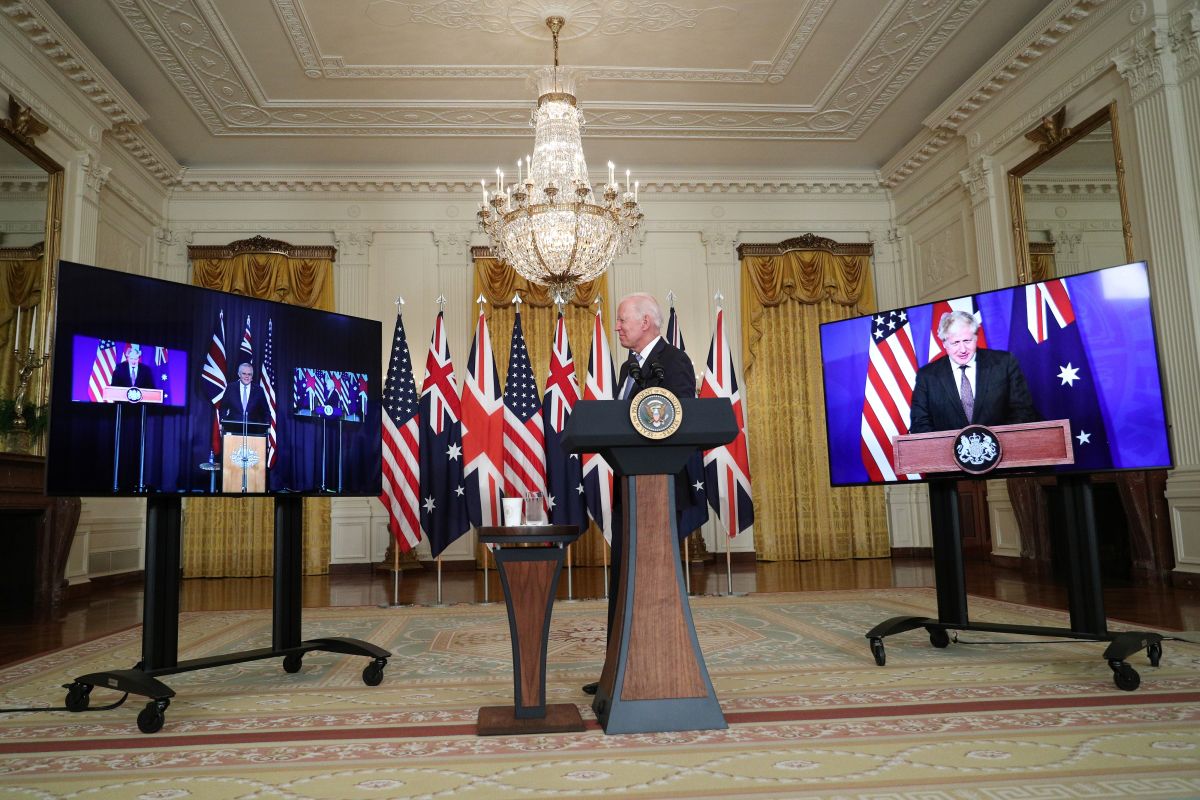AUKUS: Australia, UK, and the U.S. Strengthen Defence Cooperation
On 15 September, the leaders of Australia, UK, and the U.S. announced the creation of a trilateral security partnership—AUKUS. The deepening cooperation in this area between Australia and the U.S. will strengthen the network of American alliances in the Indo-Pacific crucial for counteracting China’s growing military potential. However, by keeping the AUKUS negotiations secret from EU allies and forcing France out of its contract to provide non-nuclear submarines to Australia, tensions in transatlantic relations have flared again, which undermines the prospects of coherent U.S. and EU policy towards the Indo-Pacific.
 Photo: Tom Brenner/Reuters
Photo: Tom Brenner/Reuters
What is AUKUS?
In a joint statement, the heads of the three states announced they had committed to deepening the exchange of information and scientific and technological cooperation as well as linking supply chains in the defence sectors. The first joint initiative is to support Australia in acquiring nuclear-powered multi-purpose submarines (armed with conventional weapons). The project is to be developed within 18 months and it is not known whether it will be based on U.S. (Virginia and Los Angeles classes) or UK (Astute class) submarines or a combination of them. In addition, the allies committed to deepening joint capabilities and interoperability in cybersecurity, artificial intelligence, quantum technologies, and underseas capabilities. This opens the way for further Australian industrial and defence cooperation with the U.S. and the UK in modern weapons systems.
How does AUKUS fit into the Biden administration’s Indo-Pacific policy?
The creation of AUKUS is the implementation of Biden’s strategy in which the Indo-Pacific is a key region for American foreign policy. The leaders of the three countries did not directly mention rival China, but the nature of the partnership and the first project to be implemented is clearly in response to that country’s growing military capabilities in the region. The U.S. and the UK have long cooperated on maritime security, and Australia’s inclusion gives it a strong regional dimension, thus strengthening U.S. alliances in the Indo-Pacific. Although the Biden administration is also deepening political relations in the QUAD format, which besides Australia and the U.S. also includes India and Japan (a summit at the White House is planned for 24 September), as well as agreements with the Philippines, Singapore, South Korea, Taiwan, and Vietnam, strengthening military cooperation is much more difficult with those countries than with Australia.
Why did Australia and the UK agree to AUKUS?
For Australia, the project is key to strengthening its military capabilities, as it aims to acquire new weapons and has often chosen to work with the U.S. in recent years, including in the F-35 and Loyal Wingman drone programmes. However, AUKUS is not a breakthrough in terms of security guarantees for Australia.
Since 1951, Australia and the U.S. have been bound by the ANZUS Treaty, which is their basis for mutual defence. They are also bound by a treaty on the exchange of intelligence (“Five Eyes”). Australia also has the status of a major non-NATO ally of the U.S.
For the UK, the deal is a means to strengthen relations with the U.S., long a pillar of British foreign policy, particularly after Brexit. The UK also is using AUKUS to highlight its greater involvement in the Indo-Pacific, as presented in the new UK strategy (Integrated Review), released in March this year. This strengthens the British position in the international arena as the second non-Indo-Pacific power after the U.S. interested and able to actively influence the region.
How has AUKUS affected transatlantic relations?
Australia’s decision to turn to the UK and the U.S. for its submarine programme meant a withdrawal from the 2016 agreement with France that included the delivery of 12 Barracuda-class craft with conventional propulsion systems. However, the project was delayed and the costs increased significantly.
In response to the cancelation of the deal, France harshly assessed the decision to form AUKUS and in protest recalled their ambassadors to both Australia and the U.S. for consultations. From the U.S. perspective, Australia’s involvement in the coalition of countries opposing China’s growing military power in the Indo-Pacific was more important than the risk of further straining transatlantic relations, particularly given that the Biden administration had already this year decided to suspend some of the sanctions on the NS2 gas pipeline, effectively allowing its completion. For France and EU institutions, the U.S. way of dealing with its allies is another argument in favour of European strategic autonomy, understood as military independence from the U.S. This has become a constant and increasingly significant point of contention in transatlantic relations.
What are the longer-term prospects for AUKUS?
China sharply criticised AUKUS, stating that it undermines stability in the Indo-Pacific, and that the countries associated with it are seeking to start an arms race. It will be difficult, however, for the U.S. to establish further military alliances in the region in the short term. Therefore, Biden may decide to tighten political relations with ASEAN to counter China’s aspirations. Transatlantic tensions may also limit the U.S. ability to gain European allies to pursue coherent policy towards China, as well as towards the Indo-Pacific overall.
The prospects for the Australian submarine programme are also distant. The implementation of the new deal must factor in the transfer of fissile materials necessary for nuclear propulsion, which Australia does not have. This raises concerns about the strength of the global non-proliferation regime (Australia is a pledged non-nuclear weapons state). Iran, in particular, may return to enriching uranium on the pretext of its use as a fuel in its own submarine programme.


